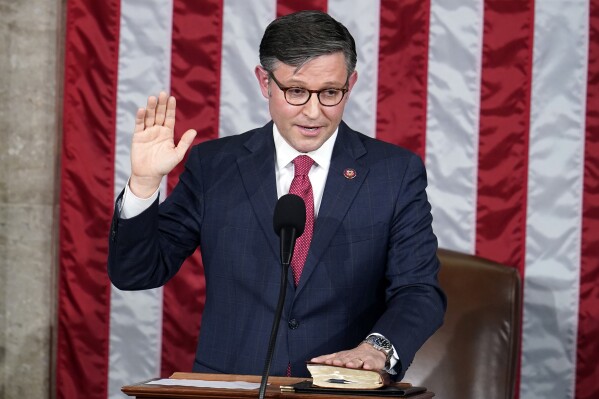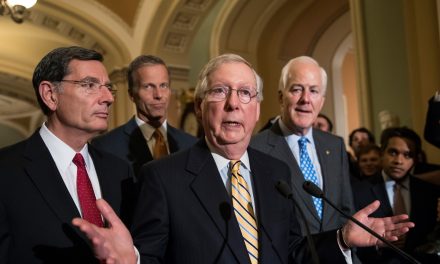The Speaker of the House is elected by the entire House, not just by members of their own party. Because Florida Republican congressman Matt Gaetz was reelected last November but subsequently resigned his seat, the Republicans will begin the next Congress with only 219 members. When the House is fully staffed at 435, the Speaker must win the support of 218 members, but that’s still true even with 434 members. And because Kentucky Republican congressman Thomas Massie has pledged not to vote for current Speaker Mike Johnson, to reach 218 Johnson must vote for himself (which is not customary) and hope that no other Republican member opposes him.
That’s a tall order. But it entered the realm of possibility for Johnson when president-elect Donald Trump gave Johnson his full-throated endorsement on Monday. There are several Republicans who are noncommittal but so far no one other than Massie who is a hard no.
Still, with no votes to spare, every Republican member has a veto on Johnson and can make demands in return for their support. And this is also true for any conceivable alternative to Johnson. In order for the Republicans to choose a partisan Speaker with no support for the Democrats, they can’t have more than one dissenter within their ranks.
Of course, there are scenarios where the Speaker isn’t elected in a strictly partisan way, but is chosen by a bipartisan coalition of lawmakers, but that would involve some kind of power-sharing agreement, which is something the GOP and the Trump administration will want to avoid at all costs.
This is the main leverage that Johnson has, because if it’s not him, it’s not clear anyone else can get the votes either, and if the House cannot settle on a partisan Speaker it will eventually have to settle on a bipartisan one.
The Republicans can probably figure out a way to finesse their way into certifying Trump’s election victory on January 6, even if they haven’t settled on a Speaker. It would require them to find at least find 218 votes on some motion to proceed to the Electoral College vote counting. Perhaps a Democrat or two would even help if only to get that bit of business settled.
But I am not sure any Democrats will be in the mood to help and the House isn’t designed to operate without a Speaker. It managed to briefly do its business in October 2023 with Rep. Patrick McHenry serving as a temporary Speaker after the ouster of Speaker Kevin McCarthy. But that came with a wrinkle. McHenry was empowered to step in because he’d been designated by McCarthy as his substitute if he was unavailable for any reason. McCarthy was only able to designate a fill-in because he was already Speaker. In the next Congress, there will be no pre-existing Speaker to designate a fill-in.
So, on January 6, in the absence of a Speaker, I assume the clerk of the House will preside, and my guess is they will allow a vote on a motion to proceed to a counting of the votes. Will it pass if the Speakership is still empty? My guess is that it will, if not immediately then before too long. The country cannot remain paralyzed indefinitely.
But certifying Trump’s victory won’t solve the problem of establishing a House leader. Trump wants that leader to be Johnson, but that doesn’t mean it will happen. And if, and it’s a big if, the Republicans succeed in electing a Speaker with no Democratic support, that Speaker will be serving at the whim of every Republican member. Never mind whatever promises they’ll have to make to win the position, they’ll still be forced to rely on Democrats to pass must-pass legislation to increase the debt ceiling and pass our spending bills to avoid government shutdowns.
There is no prospect of the House Republicans having a functional majority that can do these things on its own. So, it’s not true in any real sense that the Republicans will have a majority in the House or that any Speaker can run the place without Democratic support. This gives the Democrats a lot more power than most people realize.
There’s not only a foreseeable scenario where the Democrats can force a power-sharing agreement, but it would only take two (eventually three) party-switchers to hand them the technical majority. Of course, party-switching can happen in either direction, which is also something to keep in mind.
No matter how this all sorts in the last days of the Biden administration, it probably won’t remain stable. And given how radical Trump’s plans are, the House is going to be under immense stress. Making it minimally functional will be a tremendous challenge, and that will be true no matter who is eventually chosen as Speaker of the House.







